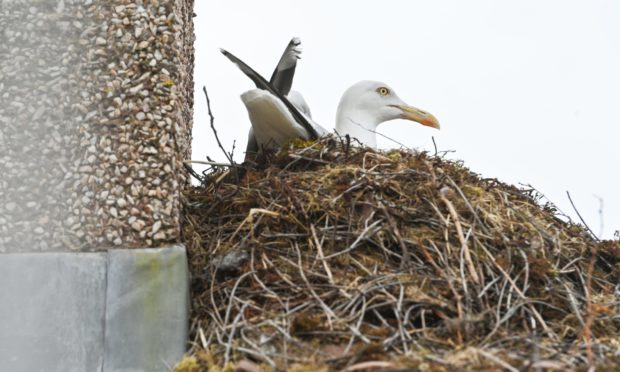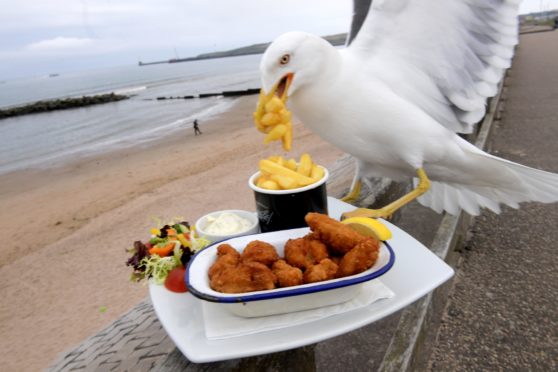Gulls have caused concern in the north and north-east for a number of years now – but why have they been so loud recently?
In many areas of the north and north-east urban gulls plague the streets, making noise at all hours of the day, leaving unsightly messes in their wake and even attacking people.
We decided to ask our readers if they had noticed gulls being particularly loud recently.
One reader commented: “We have a real problem in Peterhead, there are far more of them and colonising residential areas in droves. There would be a health and safety outcry if there were rats running about in the same numbers, something needs to be done.”
Another said they had noticed gulls had been “exceptionally loud” in Elgin this year.
One person posted that she has a family of gulls living on their roof who “dive bomb” her cats.
Many explained that with the heat they need to leave their windows open throughout the night but end up being awoken at all hours.
A reader from Aberdeen commented: “They are a nightmare around Denburn, so noisy, I cannot leave a window open during the night.”
Another said: “Try living in Bonnyview Drive. They are nesting on my roof. It’s getting to the stage I’m scared to go out with my dog.”
However, one person explained they are always loud and added “with the young on the scene I guess the numbers have grown.”
Meanwhile, another commented: “You hear them more because there is no traffic noise at present with lots of people working from home.”
Have you recorded any noisy gulls in your area? If so, email your clips to lauren.taylor@ajl.co.uk
Why are the gulls so loud at the moment?
Many explained that it is mating season for the gulls and this is why they are particularly loud at this time of year.
Ian McNab, communications officer for RSPB Scotland, explained: “The general belief is that the reason that they’re especially noisy just now – it’s a combination of things. First of all their chicks will be at a stage where a lot of them are ready to fledge, whereas before, they would have had eggs and everything would have been nice and tidy in one area.
“They could have chicks that are starting to wander about or getting ready to fly so they might be heading a bit further afield so parents are being that little bit more defensive to protect them a little bit more.
“On top of that, some of the older chicks will be at a stage where they’ll be begging now. They’ll basically be shouting at their parents like ‘we want food’ so that’s going to be adding on to what their parents are already doing.
“It all adds up and leads to a lot of noise.”
The gull mating season begins in April and they begin nesting from early May. The mating calls and squabbling can start at sunrise and continue all day.
They become aggressive when defending their nests, the parents swoop and dive at anyone who comes too close to their young.
One reader commented: “I have the joys of having one that fell from the roof and is now outside my living room window. It is fine but I can’t even open the windows as the mother goes crazy.”
Nestlings often get stuck in precarious positions which leads to them calling to their mother for help.
Additionally, when the young gulls start to fly they can become aggressive as they squabble over a shortage of food, leading to them attacking people and stealing food.
One person claimed gulls “dive bombed my trolley to steal my shopping when I came out of Sainsbury’s Kittybrewster shop.”
Some are brazen enough to enter buildings to steal food, such as Gus the gull who strolled into a Co-op in Aberdeen city centre to help himself to a sandwich.
It is thought that in September gulls are less of a nuisance as the young fly back out to the sea, however, there are increasing numbers choosing to remain in the city all year round.
What can be done to stop the nuisance?
They are such an issue in Aberdeen that the city council has been forced to put out advice for residents on how to best deal with them.
It is advised that people do not feed the gulls or drop food scraps because it will encourage the gulls to stay near the source.
Property owners can discourage gulls from nesting by erecting deterrent devices on chimney heads and flat roof areas, such as wires or nets to prevent them from landing.
However, gulls are protected under the Wildlife and Countryside Act 1981. It is illegal to capture, injure or destroy any wild bird, or interfere with its nest or eggs.
It is recommended that people take advice from specialist companies before undertaking any nest removal or egg oiling or piercing. This action needs to be considered early in the year as once the eggs have hatched, which typically happens before the end of July, the birds are not allowed to be touched.
Specialist crews spent months clearing hundreds of nests from rooftops in Elgin to reduce the size of a new generation of birds taking flight this year.
After a trial in 2019 it was expanded across the town this year as complaints about the birds have soared.
The long-term Moray Council project is expected to take several years to coax the birds out of Elgin and back to rural environments.



